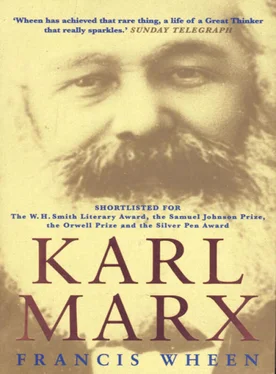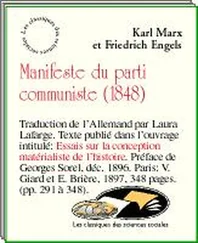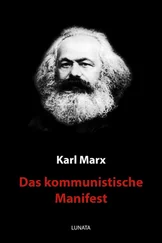Little is known about Karl Marx’s early boyhood, apart from his habit of forcing his sisters to eat mud pies. He appears to have been educated privately until 1830, when he entered the Trier High School – whose headmaster, Hugo Wyttenbach, was a friend of Heinrich Marx and a founder of the Casino Club. Although Karl later dismissed his schoolfellows as ‘country bumpkins’, the teachers were mostly liberal humanists who did their best to civilise the yokels. In 1832, after a rally at Hambach in support of free speech, police officers raided the school and found seditious literature – including speeches from the Hambach protest – circulating among the pupils. One boy was arrested, and Wyttenbach was placed under close surveillance. Two years later, the maths and Hebrew teachers were charged with the despicable crimes of ‘atheism’ and ‘materialism’ following the notorious Casino dinner of January 1834. To dilute Wyttenbach’s influence, the authorities appointed a grim-faced reactionary named Loers as co-headmaster.
‘ I found the position of good Herr Wyttenbachextremely painful,’ Heinrich told his son after attending Loers’s installation ceremony. ‘I could have wept at the offence to this man, whose only failing is to be much too kind-hearted. I did my best to show the high regard I have for him and, among other things, I told him how devoted you are to him …’ But when Marx proved his devotion by refusing to speak to the conservative interloper, he earned a paternal scolding. ‘ Herr Loers has taken it illthat you did not pay him a farewell visit,’ Heinrich wrote after Karl’s matriculation in 1835. ‘You and Clemens [another boy] were the only ones … I had to have recourse to a white lie and tell him we were there while he was away.’ Here is the authentic voice of Heinrich Marx, angry but timid, unhappy but obedient, forever letting ‘I dare not’ wait upon ‘I would’, like the cat in the adage.
His son, by contrast, always preferred to imitate the action of a tiger. ‘ Social reforms,’ Karl Marx wrote, when warning the working class not to expect any philanthropy from capitalism, ‘are never carried out by the weakness of the strong; but always by the strength of the weak.’ One could argue that he embodied this principle. Though his intellectual power seldom faltered, the body which sustained this tremendous creative fecundity was a very feeble vessel indeed. It was almost as if he decided to test on himself what he advocated for the proletariat, by defying his physical limitations and seeking out the strength of his own weakness.
Even in the full vigour of youth – before poverty, sleeplessness, bad diet, heavy drinking and constant smoking had taken their inevitable toll – he was a fragile specimen. ‘ Nine lecture courses seem to me rather a lotand I would not like you to do more than your body and mind can bear,’ Heinrich Marx advised, soon after his seventeen-year-old son started at Bonn University in 1835. ‘In providing really vigorous and healthy nourishment for your mind, do not forget that in this miserable world it is always accompanied by the body, which determines the well-being of the whole machine. A sickly scholar is the most unfortunate being on earth. Therefore, do not study more than your health can bear.’ Karl took no notice, then or ever: in later years he often toiled through the night, fuelled by cheap ale and foul cigars.
With his usual rash candour, the lad replied that he was indeed in poor health – thus provoking another earnest sermon from his Polonius of a father. ‘ Youthful sins in any enjoymentthat is immoderate or even harmful in itself meet with frightful punishment. We have a sad example here in Herr Günster. True, in his case there is no question of vice, but smoking and drinking have worked havoc with his already weak chest and he will hardly live until the summer.’ His mother, fretful as ever, added her own list of commandments: ‘ You must avoid everything that could make things worse, you must not get over-heated, not drink a lot of wine or coffee, and not eat anything pungent, a lot of pepper or other spices. You must not smoke any tobacco, not stay up too long in the evening, and rise early. Be careful also not to catch cold and, dear Carl, do not dance until you are quite well again.’ Frau Marx, one can safely say, was no skylark.
Shortly after his eighteenth birthday Marx was excused military service because of his weak chest, though he may well have exaggerated his condition. (The suspicion of lead-swinging is strengthened by a letter from his father advising him on how to dodge the draft: ‘Dear Karl, If you can, arrange to be given good certificates by competent and well-known physicians there, you can do it with a good conscience … But to be consistent with your conscience, do not smoke too much.’) The supposed disability certainly didn’t harm his enjoyment of student high jinks. An official ‘Certificate of Release’ issued after Marx’s year at Bonn University, while praising his academic achievements (‘excellent diligence and attention’), noted that ‘ he has incurred a punishmentof one day’s detention for disturbing the peace by rowdiness and drunkenness at night … Subsequently, he was accused of having carried prohibited weapons in Cologne. The investigation is still pending. He has not been suspected of participation in any forbidden association among the students.’
The university authorities didn’t know the half of it. True, the Poets’ Club – which he joined in his first term – was not a ‘forbidden association’, but neither was it quite so innocent as the name suggested: the discussion of poetry and rhetoric was a cover for more seditious talk. ‘Your little circle appeals to me, as you may well believe, much more than alehouse gatherings,’ Heinrich Marx wrote, happily imagining his boy improving the shining hour with earnest literary debate.
As it happened, Marx was no stranger to alehouses either. He was a co-president of the Trier Tavern Club, a society of about thirty university students from his home town whose main ambition was to get drunk as frequently and riotously as possible: it was after one of their revels that young Karl found himself detained for twenty-four hours, though the imprisonment did not prevent his chums from bringing him yet more booze and packs of playing cards to ease his sentence. During 1836 there was a series of fights in pubs between the Trier gang and a posse of young bloods from the Borussia Korps, who would force the student layabouts to kneel and swear allegiance to the Prussian aristocracy. Marx bought a pistol to defend himself against these humiliations, and when he visited Cologne in April the ‘prohibited weapon’ was discovered during a police search. It was only a begging letter from Heinrich Marx to a judge in Cologne which persuaded the authorities not to press charges. Two months later, after yet another fracas with the Borussia Korps, Marx accepted a challenge to a duel. The outcome of this contest between a short-sighted swot and a trained soldier was all too predictable, and he was lucky to get away with nothing worse than a small wound above his left eye. ‘ Is duelling then so closely interwoven with philosophy?’ his father asked despairingly. ‘Do not let this inclination, and if not inclination, this craze, take root. You could in the end deprive yourself and your parents of the finest hopes that life offers.’
After a year of ‘wild rampaging in Bonn’, Heinrich Marx was only too pleased to let his son transfer to the University of Berlin, where there would be fewer extra-curricular temptations. ‘There is no question here of drinking, duelling and pleasant communal outings,’ the philosopher Ludwig Feuerbach had observed while studying there ten years earlier. ‘In no other university can you find such a passion for work … Compared to this temple of work, the other universities are like public houses.’ No wonder Heinrich was so eager to sign the necessary form consenting to the move. ‘I not only grant my son Karl Marx permission, but it is my will that he should enter the University of Berlin next term for the purpose of continuing there his studies of Law …’
Читать дальше












